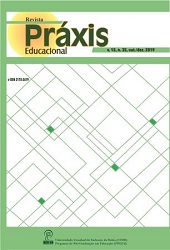METODOLOGÍAS ACTIVAS Y PARTICIPATIVAS: SUS CONTRIBUTOS PARA EL ACTUAL ESCENARIO EDUCACIONAL
DOI:
https://doi.org/10.22481/praxisedu.v15i35.5673Palabras clave:
Metodologías activas y participativas, Enseñanza de adultos, Formación professionalResumen
The so-called "participatory and active teaching methodologies", one of the main approaches of contemporary teaching, defend the centrality of the learner’s (pro) active role in the architecture of his/her learning process. Advocating that learning takes place in actual time and real contexts, close to the circumstantiality of the subjects, incorporating a high level of motivation and personal engagement, these methodologies are considered as the most favorable to discuss and deal with the professional, social and personal challenges that learners face. There are many studies that are currently carried out in the field of active methodologies. However, they are mainly directed to the application of these methodologies in certain learning contexts, and there seems to be a gap in the discussion of its general principles and bases. Thus, the objective of this article is to collaborate for this discussion, elaborating a framework of the main definitions of these methodologies, the underlying epistemological principles, as well as their limitations, potentialities and more recent perspectives. Methodologically, this is a conceptual synthesis of literature, based on reference documents in the field, especially considering those who analyze the use of these methodologies in adult education and vocational training. As a result, we argue that active and participative methodologies can collaborate to qualify adult education and professional training, whereas they are not restricted to instrumentalize the formative process, but organized to promote deep learning both in terms of understanding, and on the development of skills and engagement with the value of personal and community’s life.
Descargas
Métricas
Descargas
Publicado
Cómo citar
Número
Sección
Licencia
Usted es libre de:
Compartir — copiar y redistribuir el material en cualquier medio o formato; Adaptar — remezclar, transformar y construir a partir del material para cualquier propósito, incluso comercialmente. Esta licencia es aceptable para Obras Culturales Libres. La licenciante no puede revocar estas libertades en tanto usted siga los términos de la licencia.
Bajo los siguientes términos:
Atribución — Usted debe dar crédito de manera adecuada, brindar un enlace a la licencia, e indicar si se han realizado cambios. Puede hacerlo en cualquier forma razonable, pero no de forma tal que sugiera que usted o su uso tienen el apoyo de la licenciante.
No hay restricciones adicionales — No puede aplicar términos legales ni medidas tecnológicas que restrinjan legalmente a otras a hacer cualquier uso permitido por la licencia.










